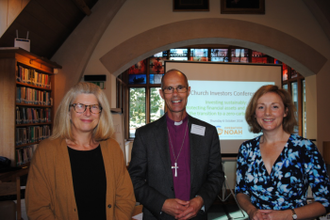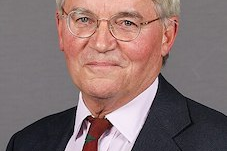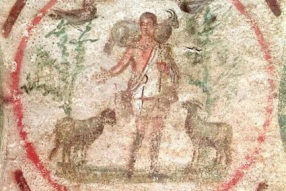Text: Bishop Cheetham - 'Your gospel is too small'

Bishop Richard Cheetham with Pilita Clark and Sian Ferguson image Operation Noah
Presentation by the Anglican Bishop of Kingston, the Right Rev Dr Richard Cheetham, to the church investors' conference on 'Investing sustainably: protecting financial assets and supporting the transition to a zero carbon future' at Southwark Cathedral 6th October 2016
Introduction
I am very grateful indeed to Operation Noah, the Quakers, and the Sainsbury Family Charitable Trusts for this opportunity to address this important conference for investors on sustainable investment. There is little doubt in my mind that the issues of climate change and care of the environment are at an absolutely critical moment and are among the most substantial issues that humankind faces in the 21st-century
Under the title 'Your gospel is too small', I want to argue this morning that a proper attitude the care of the planet flows directly from our understanding of the Christian gospel. This is not a specialist interest area for some Christians, but rather one which is central to Christian belief and action in the world today. It is not an optional extra, but something for every Christian on the planet. Similar conclusions may well be found in other major faiths and worldviews.
The call to action
In a paper written last year Bishop David Atkinson said the following:
"Why are we in the Christian church so slow in responding to the most important moral issue of our generation: climate change? If the climate scientists are right, and there is huge majority agreement . . . , much of the Earth could be uninhabitable in 100 years' time, and the world. My grandchildren inherit would be very different from today's world, and much more painful place to live in. And yet large majority of Christian people are carrying on as though business is as usual".
Let me tell you a little bit of my own personal journey into thinking why we need to act urgently and have these matters at the heart of our Christian faith. In the early 1970s when I was completing my
A-levels in maths and physics, and beginning my first degree, I was much influenced by three particular books:
* Only one Earth - a report written in 1972 on the care and maintenance of a small planet
* Small is beautiful - EF Schumacher's argument in 1974 for economics as if people mattered
* Enough is enough - Bishop John V Taylor's argument that we should live simply that others may simply live
Those three books summarised the serious challenges at that time. Now things are exponentially worse. There is overwhelming scientific evidence of the calamitous effect of human behaviour on our climate. There is also a massively unequal distribution of wealth across the globe with serious questions about justice and equality with growing discussion about the bottom billion, and a focus on the 1% of people who own 50% of the world's wealth.
I used to live on the edge of the Yorkshire Dales where lead mining used to be a significant industry. The miners of the time simply left the spoil heaps where they were and they can be seen today. In our time the sheer scale of human activity means that we can no longer get away with simply dumping waste any elsewhere. Pope Francis in his recent encyclical has said, "The Earth, our home, is beginning to look more and more like an immense pile of filth".
The system is now at breaking point, if not beyond. As President Obama has recently said, "we are the first generation to know about climate change and the last generation that can do something about it."
So there is little doubt in my mind that it is time for urgent action. The Church of England has formed an environmental working group to try to coordinate its response and I am one of three bishops on that group. In my own diocese of Southwark we have developed an environmental policy, but the problem, as in so many places, is not in developing the policy, but rather in getting it embedded deeply within the life of the diocese.
Theological and spiritual inspiration for climate change action.
In order to spur us on we need a more holistic understanding of the Christian gospel which truly embraces all the classic five marks of mission. Bishop David Atkinson, in the paper I have already quoted, ends by saying, "I think much Christian theology has become virtually overtaken by the view that salvation is essentially something to do with our individual souls, and our journey to heaven. What has got lost is the truth of the redemption of all things in Christ, the wisdom of God in whom all things hold together, in whom all things are reconciled to God, and in whom heaven and earth are joined."
It is not difficult to find central theological ideas and related biblical themes which emphasise this more cosmic and holistic understanding of the gospel. To give just a few examples:
- the Word of God, understood as God's very self -expression in creation is described in soaring terms in the prologue of John's Gospel
- the Wisdom of God, understood using female imagery as the creative presence of God in t he world is described, for example, in Proverbs chapter 8
- the Spirit of God as God's transforming and sanctifying presence in the world is explored by Paul in Romans chapter 8
- the Salvation of God is described in cosmic terms which embraces the whole of creation in the first chapters of the letters to the Ephesians, and the Colossians.
- The Resurrection of God for the whole created order is described in one Corinthians chapter 15
All of these ideas are integrally linked to the Christian understanding of th e state of humankind. To live properly as human beings we need to be in the right relationship with other people, with the planet, and with God. In short, we are meant to be relational beings, reflecting the deep relationship of love, which is found in the heart of God as Trinity. But these relationships have been profoundly fractured by our self-centred and egocentric ways of life with deeply damaging consequences for ourselves and our environment.
All these gospel and biblical themes are explored in the body of Catholic social teaching of which Pope Francis's encyclical, Laudato Si, is a part. They are also included in Anglican social teaching and in the recent paper from the ethical investment advisory group of the Church Commissioners.
Implications of this more holistic understanding of the gospel
I want to draw our attention to three particular outcomes of this understanding.
A radical reappraisal of our culture
This phrase occurs in the recent book on Anglican social theology,edited by Malcolm Brown. Its ays, "The acceptance of the autonomy of economics, the obsession with endless growth and the satisfaction of individual consumer preferences are starkly incompatible with our finite ecological system". Laudato Si speaks of "the dominant technocratic paradigm" in which "the market tends to promote extreme consumerism in an effort to sell its products [and] people can easily get caught up in a whirlwind of needless buying and selling." This compulsive consumerism needs challenging. We must be aware of a possible 'deification of the market'.
One element of the technocratic paradigm is the idea that there is "a deep fracture in modern Western societies [because] the public realm has come to be seen as an objective fact and deterministic, with technocratic manipulation of the environment and persons in the name of utility. Other values are purely subjective and are relegated to the private realm". (Anglican social theology ed. Malcolm Brown p.39). We need to learn once again how to intertwine our values and our behaviour. Economics is not a value free - it is about how human beings treat one another and the environment.
Pope Benedict urged us to realise that creation is harmed, "Where we ourselves have the final word, where everything is simply our property and we use it for ourselves alone. The misuse of creation begins when we no longer recognise any higher incidence than ourselves, when we see nothing else but ourselves." (Laudato Si para 6). This reflects a verse from Romans chapter 1, "for though they knew God, they did not honour him as God, but they became futile in their thinking and their senseless minds were darkened . . . They exchanged the truth about God for a lie, and worshipped and served the creature rather than the Creator, who is blessed forever."
The radical reappraisal of our culture involves placing God firmly at the centre. There is a fundamental disorder, chaos and suffering when we live in a self -centred way. In short, we are to take sin seriously at every level of life.
Inner ecological conversion
Pope Francis commends the Orthodox patriarch Bartholomew for drawing attention to "the ethical and spiritual roots of environmental problems, which require that we look for solutions not only in technology, but in a change of humanity; otherwise we would be dealing merely with symptoms". (Laudato Si para 9). In Luke, chapter 16. Jesus says, "no slave can serve two masters: for a slave will either hate the one and love the other, or be devoted to the one and despise the other. You cannot serve God and wealth."
This stark contrast is partly based on the understanding of wealth involved in the word "Mammon" which is Greek transliteration of the Semitic word meaning that in which one fully trusts. In 1 Timothy chapter 6, we are told that "a love of money is a route of all kinds of evil".
The chapter goes on to warn us not to set hopes on the uncertainty of riches, but rather on God. In Romans chapter 12, Paul urges us to "not be conformed to this world, but be transformed by the renewing of your, so the greater say what is the will of God - what is good and acceptable and perfect".
One important part of this inner ecological conversion is our attitude to time. In paragraph 222 of Laudato Si, Pope Francis says, "Christian spirituality proposes an alternative understand of the quality of life, and encourages a prophetic and contemplative lifestyle, one capable of deep enjoyment free of the obsession with consumption". Our frantically busy lives can be seen as a consequence of a greed to consume obsessively. In para 225 Pope Francis says, "many people today sense a profound imbalance which drives them to frenetic activity and makes them feel busy, in a constant hurry, which in turn leads them to ride roughshod over everything around them. This too affects how they treat the environment. An integral ecology includes taking time to recover a serene harmony with creation".
Lifestyle and praxis
So what are the implications as to how we should behave? And in particular our attitude to investment?
The first implication is that "serious ecological problems call for an effective change of mentality, leading to the adoption of new lifestyles in which the quest for truth, beauty, goodness and communing with others for the sake of the common good of the factors th at determine consumer choices, savings and investments." (Compendium of the Social Doctrine of the Church para 486)
Part of this will be an awareness that "environmental protection cannot be assured's solely on the basis of financial calculations of costs and benefits. The environment is one of those goods that cannot be adequately safeguarded or promoted by market forces." (Laudato Si para 190). More specifically, "as regards the ecological, social doctrine church reminds us that the goods of the Earth were created by God to be used wisely by all. They must be shared equitably in accordance with justice and charity." (Compendium of the social doctrine of the Church para 481).
Pope Francis urges "a global consensus" which "could lead to planning for sustainable and diversify agriculture, developing renewable and less polluting forms of energy, encouraging a more efficient
use of energy, promoting better management of marine resources, and ensuring universal access to drinking water." (Laudato Si para 164)
On the specific issue of fossil fuels, "we know that technology based on the highly polluting fossil fuels - especially coal, but also oil and, to a lesser degree gas - needs to be progressively replaced without delay." (para 165).
Those with responsibility for long-term investment have a particularly important role to play, and especially given the pressure to short-term fixes which many politicians feel given the electoral cycle. "Policies relating to climate change and environmental protection cannot be altered with every change of government. . . To take up these responsibilities and the costs they entail politicians will inevitably clash with the mind-set of short-term gain results which dominates present-day economics and politics." (para 181) . There is also a primary duty to calculate the whole costs of any business venture, "environmental impact assessment should not come after the drawing up of a business proposition for the proposal of a particular policy, plan or program. It should be part of the process of beginning and be carried out in a way which is interdisciplinary, transparent and free of all economic and political pressure".
Over to you. . . The role of church investors
Church investors can act as a very significant catalyst in changing investment behaviour. There is an urgent need for divestments from damaging forms of fossil fuels, and also substantial investment in fossil free energy. We need to engage in significant shareholder pressure and to campaign from outside the system. There will always be some debate about which actions are most effective but, however it is done, it is absolutely vital to engage in responsible investment that helps us in the care of our planet.
The science is conclusive - and tells us what is going to happen unless we act urgently and decisively. The politics and economics tell us how difficult it is to get the message across and to get effective and agreed action. Our theology and spirituality tell us how understand our human situation more deeply, why we should care, and how we can respond creatively. In the end the Christian faith is fundamentally full of hope. In the pattern of Christ's death and resurrection, we see God 's self-giving love is always at work to bring new life to the darkest and most difficult situations. This faith can infuse and shape our we see live our lives, including the major economic and investment decisions which we make, which will have found implications for generations to come.
Rt Revd Dr Richard Cheetham


















